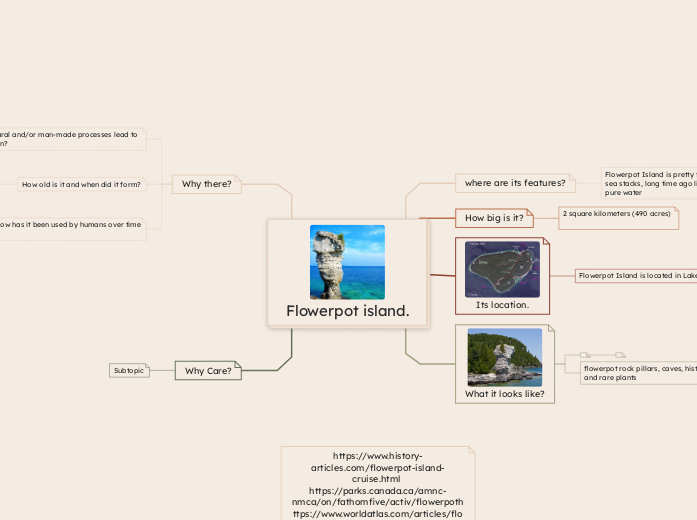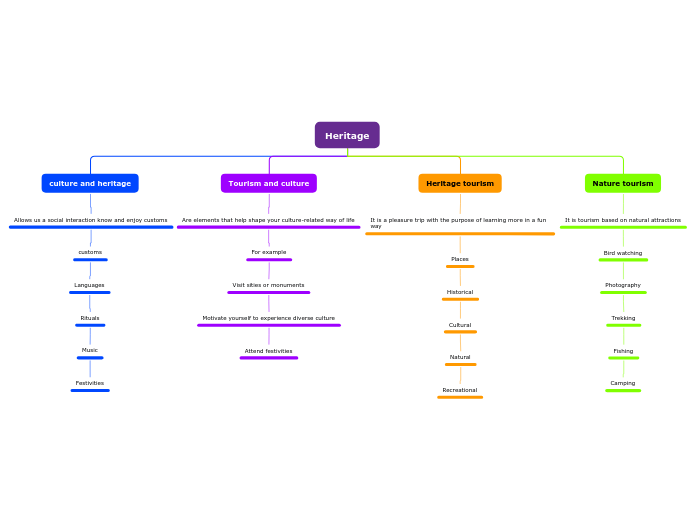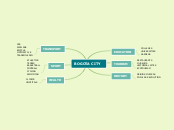Sources:
https://www.worldatlas.com/articles/flowerpot-island-unique-landforms-of-north-america.html
https://www.gsi.ie/en-ie/geoscience-topics/natural-hazards/Pages/Coastal-Erosion.aspx#:~:text=A%20sea%20Stack%20forms%20when,known%20as%20a%20sea%20stack.
https://www.history-articles.com/flowerpot-island-cruise.html
https://www.history-articles.com/flowerpot-island-cruise.html
https://parks.canada.ca/amnc-nmca/on/fathomfive/activ/flowerpot
http://parkscanadahistory.com/publications/fathomfive/vum-flowerpot-is-e-2020.pdf
http://parkscanadahistory.com/publications/georg/brochures/flowerpot-island-trail-guide-e-1985.pdf
https://cruises.bruceanchor.com/the-sights/#:~:text=Just%206.5%20kilometers%20off%20the,Tobermory's%20historic%20shipwrecks%2C%20click%20here.
Flowerpot Island
Why Care?
Who are some of the stakeholders in relation to this feature
Political
Bruce County Council and Municipal Governments
Environmental
Parks Canada and Conservation Groups
Economical
Bruce County Council and Local Businesses that relies on tourism
Social
Parks Canada, Friends of the Bruce District Parks Association, Local Residents, Visitors, Tour Operators
How is it being protected / preserved? Are there any organization dedicated to protecting it
Parks Canada Agency
Site Management
Maintaining infrastructure (trails, boardwalks, waste management facilities) to minimize human footprint.
Restricting access to sensitive areas to protect rare vegetation.
Implementing conservation planning to prevent ecological degradation.
Visitor Management
Encouraging responsible tourism through education and awareness programs.
Introducing a visitor capacity limit to reduce environmental impact.
Enforcing compliance with regulations among visitors and tour operators.
What other big issues is this related to?
Impact on Local Communities
Strain on Infrastructure
Environmental Risks
Increased risk to public health and safety
What are some examples of flora / fauna that rely on this place
Fauna
Squirrels, the snowshoe hare, the eastern garter snake, and multiple species of birds
Flora
Bird’s-eye Primrose, Columbine, Fringed Polygala, Herb-Robert, Harebell, Green-leaved Rattlesnake Plantain, Large-leaved Aster.
Why is it important / unique / interesting
Historical Sites
Adventure and Exploration for Visitors
Well-preserved Shipwrecks
Flowerpot island Light Station
Geological Features
biodiversity hotspot, home to multiple rare species of plants and animals
extraordinary natural and cultural landmark. It is best known for its iconic limestone sea stacks, commonly referred to as “flower pots.”
Why there?
How has it been used by humans over time
?
People take ferries there to hike, have picnics, swim, snorkel, and many other activities. There is also a lighthouse and Indigenous people have fished there for over 1,000 years. An Indigenous legend said that evil spirits inhabited the island so no one ever lived there.
The lighthouse helps guide boats at night.
How old is it and when did it form?
It is estimated that it formed around 1,645 years ago (about the year 380).
What natural and/or man-made processes lead to its creation?
Over hundreds of years ago, the part of the island that was a sea arch partially collapsed because it was eroded away by wind and water, leaving the remainder, the “flower pot” part of the island also called a sea stack.
Here is one of the sea stacks.
What it looks like?
flowerpot rock pillars, caves, historic light stations, and rare plants
Kyrene Velando
Megan Vathi
Ayan Kassim
Its location.
Flowerpot Island is located in Lake Huron
How big is it?
2 square kilometers
where are its features?
Flowerpot Island is pretty famous for its large size sea stacks, long time ago lighthouse, trails, and its pure water









